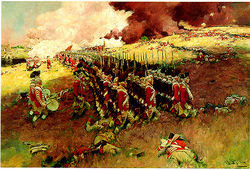“Don’t fire until you see the whites of their eyes” William Prescott, an American officer, at the Battle of Bunker Hill
The Battle of Bun ker Hill took place on June 17, 1775, as part of the Siege of Boston during the American Revolutionary War. By the time the battle had started, 1,400 colonists faced 2,600 British regulars.The result was a Pyrrhic victory for the British, who suffered more than 1000 casualties compared to only about 450 Colonists. It is considered by some to be the bloodiest battle of the war. Being outnumbered almost 2 to 1, William Prescott knew his troops could not afford to miss their targets if they were to have any chance at winning, thus the famous order was given. He knew the closer the British troops came to the colonists, the better his musket troops potential for hitting them was. Their muskets were not very accurate to begin with and as the distance increased from a target what little accuracy they did have decreased. Despite how badly his troops wanted to fire and how difficult it was to wait, they exercised discipline, waited, and inflicted massive casualties on the British troops. Even though they eventually lost the battle, it enabled the Colonists recapture Boston from the British as depleted and exhausted British troops were unable to stop their siege of the city. I can just picture you reading this now thinking “what the hell is he talking about, what does Bunker Hill have to do with investing”? Trust me it does…
ker Hill took place on June 17, 1775, as part of the Siege of Boston during the American Revolutionary War. By the time the battle had started, 1,400 colonists faced 2,600 British regulars.The result was a Pyrrhic victory for the British, who suffered more than 1000 casualties compared to only about 450 Colonists. It is considered by some to be the bloodiest battle of the war. Being outnumbered almost 2 to 1, William Prescott knew his troops could not afford to miss their targets if they were to have any chance at winning, thus the famous order was given. He knew the closer the British troops came to the colonists, the better his musket troops potential for hitting them was. Their muskets were not very accurate to begin with and as the distance increased from a target what little accuracy they did have decreased. Despite how badly his troops wanted to fire and how difficult it was to wait, they exercised discipline, waited, and inflicted massive casualties on the British troops. Even though they eventually lost the battle, it enabled the Colonists recapture Boston from the British as depleted and exhausted British troops were unable to stop their siege of the city. I can just picture you reading this now thinking “what the hell is he talking about, what does Bunker Hill have to do with investing”? Trust me it does…
The 400 point decline in the Dow Jones on Tuesday and the Wednesday rebound was for investors, our Bunker Hill. There is an almost irresistible need for people to do something, anything, on days like these. When the market is selling off huge, you are driven to sell yourself as you watch profits evaporate, then, on the inevitable bounce the following day, you want to dive right back in and buy everything in sight. You must exercise the same discipline the colonist had at Bunker Hill. Just like their muskets were not accurate at long distances, your decisions are not accurate when you make them based on emotion, not reason. The more emotion, the less accuracy. You should have conditions in place that cause you to either buy or sell the stock of a company and those conditions should have nothing to do with the direction of the market. A decision to sell should be based on business fundamentals, not a temporary drop in price and a buying decision should only be made when a stock hits a predetermined price. You then must exercise discipline on days like these, ignore the market and patiently wait until those conditions are met before acting, or in the words of Prescott, you “see the whites of their eyes”.
If you are a value investor, this process becomes easier in times like this. To look for “value” you must be a contrarian by nature. What does that mean? When everyone is buying a stock, we value folk immediately think it is over priced. When nobody wants it, we tend to think there must be something there worth having. Put simply by Warren Buffet, “I buy fear and sell greed”. Why does this matter? Instead of panicking and selling on days like Tuesday, I begin to get excited as stocks I am watching like Caterpillar (CAT ) and Harley Davidson (HOG ) crept down to the prices I would be willing to pay for them. They never got there so I did not buy them, but who knows, maybe another down day will give me a chance?
By having the discipline to stick to our parameters we should be able to beat the S&P (remember what we are looking for, down less in down days, up more in up days). Despite the market turmoil the past two days, by sitting, watching and waiting like the colonists did the ValuePlays Portfolio picked up almost a full 1% against the S&P. Like them, we will take our Bunker Hill lumps at times, but by exercising discipline like they were able to, we can put in place the elements to win the war…